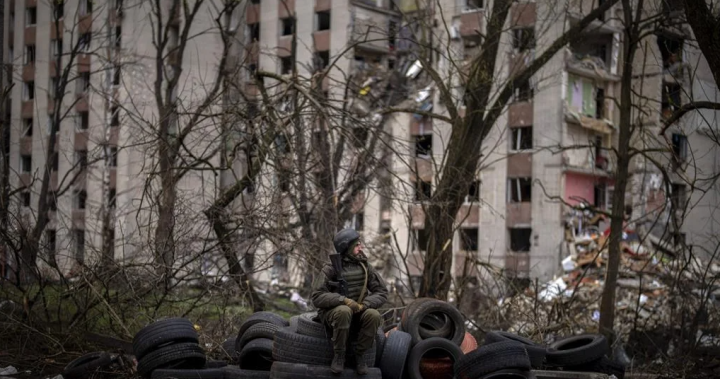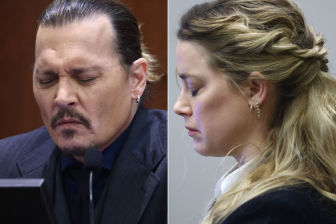As Russia’s war on Ukraine enters 3rd month, here’s a look at what’s happened so far – National | Globalnews.ca
As Russia moves into the third month of its war against Ukraine, there seems to be no end in sight to the aggression that has cost the lives of thousands, displaced millions, and battered cities into dust.
More than five million people have fled the country since Russian troops invaded on Feb. 24, the UN refugee agency reported on April 22.
Read more:
Ukraine says Russia tried to storm Mariupol steel plant as battle for control presses on
In his announcement on Feb. 24, Putin vowed to “demilitarize and denazify” Ukraine, while promising Russia was not interested in occupying the country.
Ukrainian forces has mounted stiff resistance and the West has imposed sweeping sanctions in an effort to force Russia to withdraw its troops.
Here’s a look at what happened so far.
Russia’s ‘special military operation’
Feb 24: Russia invaded Ukraine on three fronts in the biggest assault against a European state since World War Two. Russian President Vladimir Putin announced in a “special military operation” in eastern Ukraine in a televised addess.
Canada and other Western allies responded by slapping sanctions on Russian oligarchs and major banks. The sanctions targeted 58 individuals and entities, including members of the Russian elite and their family members.
On the same day, blasts were heard across Ukraine, including the cities of Kyiv, Kharkiv and Mariupol. The historic Chornobyl Nuclear Plant was seized by Russian forces.
Where Russian forces have pushed in Ukraine
Feb 25: Russia vetoed a UN Security Council resolution demanding that Moscow immediately stop its attack and withdraw all troops, a defeat the United States and its supporters knew was inevitable but said would highlight Russia’s global isolation.
The vote was 11 in favour, with Russia voting no and China, India and the United Arab Emirates abstaining. It showed significant but not total opposition to Russian President Vladimir Putin’s invasion of his country’s smaller and militarily weaker neighbour.
Feb 28: The first round of talks between Ukraine and Russian officials took place in Belarus. Ukraine wanted an immediate ceasefire and the withdrawal of Russian forces. Agreement wasn’t reached with the Russian delegation. The Kremlin declined to comment on its goals.

Russian banks excluded from SWIFT
March 2: The European Union elbowed seven Russian banks from the SWIFT messaging system. SWIFT, or the “Society for Worldwide Interbank Financial Telecommunication”, is a secure messaging system that facilitates rapid cross-border payments and, therefore, international trade.
Russian banks VTB VTBR.MM, Bank Otkritie, Novikombank, Promsvyazbank PSKBI.MM, Bank Rossiya, Sovcombank and VEB were given 10 days to wind-down their SWIFT operations.
Removing Russian banks from SWIFT, a measure seen as drastic and unlikely only a week before it was announced, was one of the most powerful tools Western authorities have used to punish Russia for invading Ukraine.
March 4: Russia criminalized independent reporting on Ukraine war in a new law that threatened journalists with jail terms of up to 15 years for spreading “fake news.”
As a result, several international news outlets suspended reporting in Russia to protect their journalists. Britain’s BBC temporarily halted reporting in Russia. By the end of the day, the Canadian Broadcasting Company and Bloomberg News said their journalists also stopped work. CNN and CBS News also said they would stop broadcasting in Russia. Other outlets removed the bylines of Russian-based journalists.
On the same day, Russia seized Europe’s largest nuclear power plant in Ukraine, drawing widespread criticism around the world. Moscow’s attack at the Zaporizhzhia nuclear power plant, near the town of Energodar, resulted in at least one fire that firefighters put out, Ukrainian and UN officials said.

Russia bombs children’s hospital in Mariupol
March 9: Ukraine accused Russia of bombing a children’s hospital in the besieged port city of Mariupol, during an agreed ceasefire to enable civilians trapped there to escape.
Russia had said it would let thousands of civilians flee Mariupol and other besieged cities, but the city council said a hospital was hit several times during an airstrike.

March 13: Russian missiles struck the International Centre for Peace and Security in Yavoriv, a military training centre close to the Polish border, killing at least 35. The base was a hub for international volunteers who arrived to help Ukraine repel Russian forces. Ukraine’s Minister of Defence, Olekii Reznikov, decried what he called a “terrorist attack on peace and security near the EU-NATO border.”
March 15: Ukraine’s President Volodymyr Zelenskyy addressed the U.S. Congress and Canada’s House of Commons on the same day and urged them to establish a no-fly zone over Ukraine, while imposing more sanctions on Russia.
Prime Minister Justin Trudeau and other leaders of the NATO military alliance ruled out a no-fly zone in Ukraine despite repeated pleas from the country’s leadership. Enforcing a no-fly zone would require a willingness to shoot Russian jets out of the sky — a red line that Trudeau and NATO leaders warned could escalate the war into open conflict with nuclear-armed Russia.

March 16: Russian forces destroyed a theatre in Mariupol where hundreds of women and children were sheltering. On the same day, Ukrainian officials reported that 10 people were killed in Chernihiv while standing in a bread line.
March 22: Satellite images showed 90 per cent of Mariupol’s infrastructure destroyed. Russia bombed the southeastern port city since the war began on Feb. 24, and reduced it to ruins.
Destruction of residential apartment buildings in Mariupol can be seen on March 29 in the southern Ukrainian city (Satellite image ©2022 Maxar Technologies).
Satellite image ©2022 Maxar Technologies
March 25: Moscow signalled it was scaling back its ambitions to focus on territory claimed by Russian-backed separatists in the east. Ukrainian forces went on the offensive to recapture towns outside Kyiv.
In an announcement that appeared to indicate more limited goals, the Russian Defence Ministry said the first phase of its operation was mostly complete and it would shift focus on the eastern Donbass region, which has pro-Russia separatist enclaves.
On the same day, the United Nations refugee agency said that about 3.7 million Ukrainians had fled the country since the Russian invasion began, with about two million refugees crossing into Poland.
April 3-4: Ukraine accused Russian forces of carrying out a “massacre” in the town of Bucha, while Western nations reacted to images of scattered dead bodies. There were calls from around the world for new sanctions against Moscow.
Russia’s defence ministry denied the Ukrainian allegations, saying footage and photographs showing bodies in Bucha were “yet another provocation” by the Ukrainian government.

Bucha’s deputy mayor, Taras Shapravskyi, said 50 of some 300 bodies, found after Russian forces withdrew from the city, were the victims of executions carried out by Russian troops.
Ukraine also said it found 410 bodies in towns near Kyiv, the capital, in an investigation into possible war crimes, and called for an International Criminal Court probe. France and Britain said signalled support for an investigation.
April 8: Ukraine and its allies blamed Russia for a missile attack on a train station in Kramatorsk that killed at least 52 people trying to flee the looming eastern offensive. Russia denied responsibility.
Zelenskyy called the strike in Kramatorsk in the eastern region of Donetsk a deliberate attack on civilians. The town’s mayor estimated about 4,000 people were gathered there at the time.
April 14: Russia’s lead warship in the Black Sea, the Moskva, sinks after an explosion and fire that Ukraine says was caused by a Ukrainian missile strike. Russia says the ship sank after an ammunition explosion. Washington believes the warship was hit by two Ukrainian missiles.

April 20: Ukraine had a pre-war population of 44 million, and UNHCR said the conflict has displaced more than seven million people within Ukraine along with the 5.03 million who had left as of April 20. According to the agency, another 13 million people are believed to be trapped in the war-affected areas of Ukraine.
Putin claims victory in Mariupol
April 21: Russian President Vladimir Putin claimed victory in the biggest battle of the Ukraine war, declaring the port city of Mariupol “liberated,” although hundreds of Ukrainian troops and civilians continued to hold out inside the massive Azovstal steel work plant. Ukrainian officials denied the Russian claim.
The capture of Mariupol would have represented the Kremlin’s biggest victory in Ukraine. It would help Moscow secure more of the coastline, complete a ‘land bridge’ between Russia and the Crimean Peninsula, which Russia seized in 2014, and free up more forces to join the larger and potentially more consequential battle underway for Ukraine’s eastern industrial heartland, the Donbas.

April 22: A Russian general said Moscow wants to take full control of southern and eastern Ukraine.
Rustam Minnekayev, deputy commander of Russia’s central military district, was quoted by Russian state news agencies as saying full control over southern Ukraine would give it access to Transnistria, a breakaway Russian-occupied part of Moldova in the west.
That would cut off Ukraine’s entire coastline and mean Russian forces pushing hundreds of miles west beyond current lines, past the major Ukrainian coastal cities of Mykolaiv and Odesa.

On the same day, Canada’s Finance Minister Chrystia Freeland said that Russia should be booted from the G2), an international forum to manage global economic concerns, over its unprovoked invasion of Ukraine and the destabilizing effects it has had. This was a key topic of discussion during meetings this week of finance ministers and central bankers from the group of nations in Washington, D.C.
Russia says it has control of some villages in Donbas
April 23: Russian forces in Ukraine tried to storm a steel plant occupied by soldiers and civilians in the southern city of Mariupol, while attempting to crush the last corner of resistance in a place of deep symbolic and strategic value to Moscow, Ukrainian officials said.
The reported assault on the eve of Orthodox Easter came after the Kremlin claimed its military had seized all of the shattered city, except for the Azovstal plant. Meanwhile, Russian forces pounded other cities and towns in southern and eastern Ukraine.
On the same day, Russia claimed it had taken control of several villages in the eastern Donbas region and destroyed 11 military Ukrainian military targets overnight, including three artillery warehouses. Russian attacks also struck populated areas of Ukraine.

— With files from The Associated Press and Reuters.
© 2022 Global News, a division of Corus Entertainment Inc.
For all the latest world News Click Here




